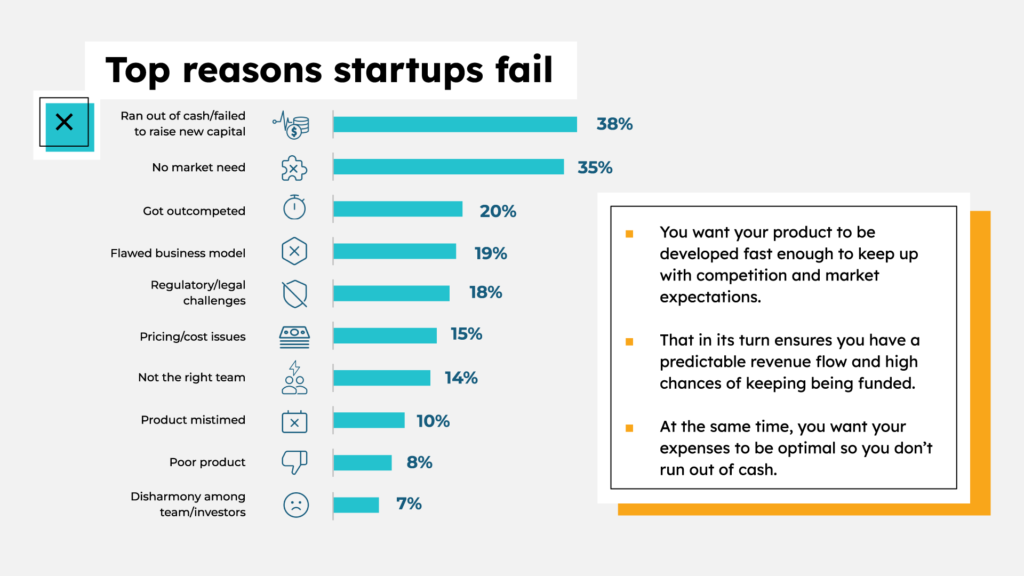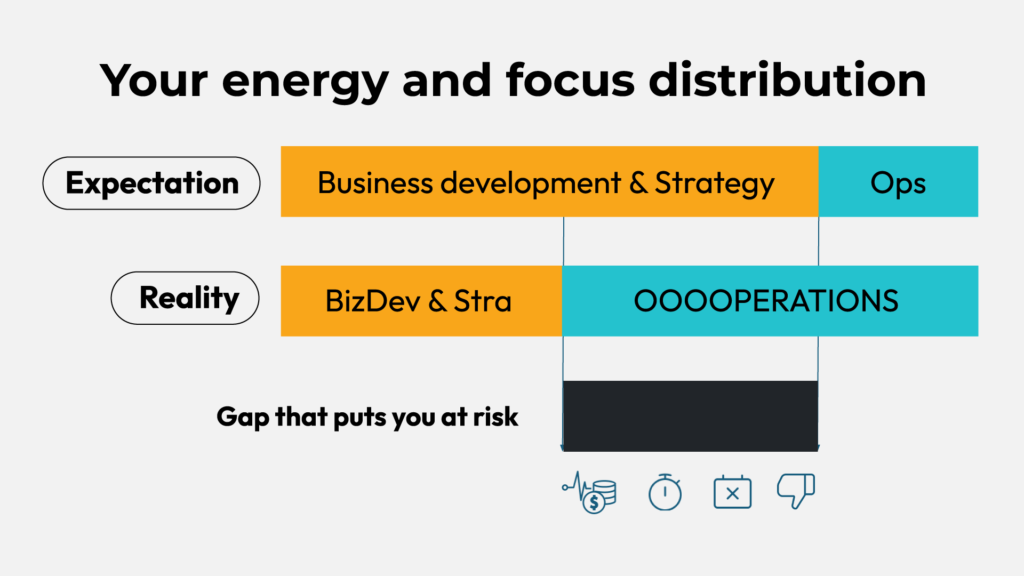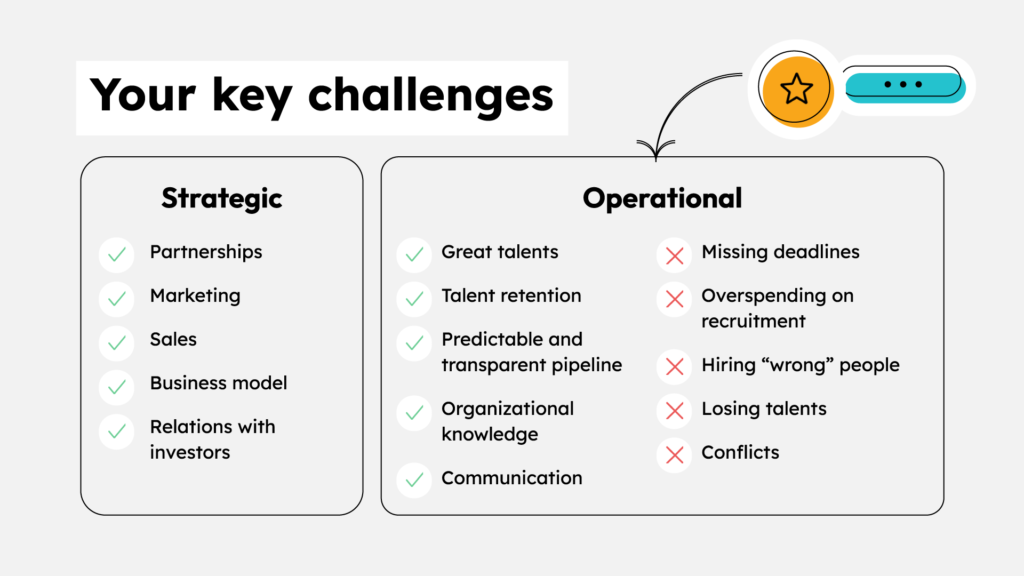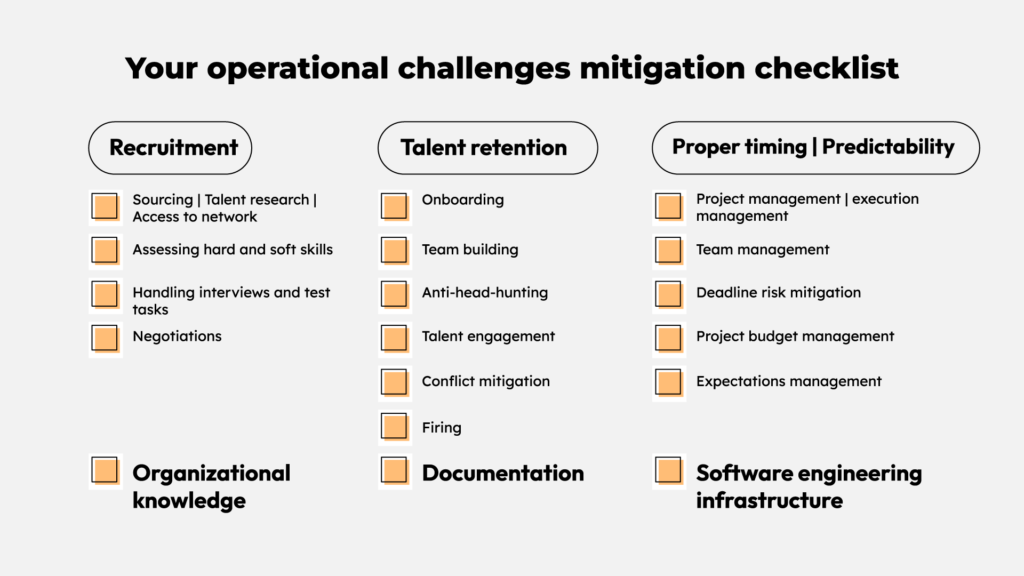Sharing insights from a presentation Unicsoft CEO and founder Aleksey Zavgorodniy did for the startup community at HUB31 startup breakfast.
Last month, Aleksey Zavgorodniy, Unicsoft CEO and founder, had the pleasure of sharing his hands-on experience with a wider tech community in the cozy atmosphere of HUB31. The attendees enjoyed not just the aroma of fresh coffee and bagels but also the good vibes of ideas leading to the startups’ success. In conversation with Unicsoft’s clients and long-time partners Dmitry Likhachev, Head of IT at AFC Claims GmbH, and Felix Letkemann, CIO at IoT Venture GmbH, Aleksey discussed the specifics of product development management and the ways of tackling operational challenges for startups and scaleups.
Keep reading for the highlights from Aleksey’s presentation. The takeaway points include practical advice on how startups can benefit from growth and avoid its potential drawbacks.
We will also walk you through a few real-life cases the top managers of German tech companies had to navigate and analyze how they did it, tapping into Unicsoft expertise. Watch for quotes from Dmitry Likhachev and Felix Letkemann with spot-on insights.

No growth without challenges
As Paul Graham famously said almost a decade ago, “A startup is a company designed to grow fast. Everything else we associate with startups follows from growth.” We can’t help but agree with his statement. Growth has always been seen as a startup’s upside tightly linked to its business profitability. Let’s not forget, though, about the reverse side of growth — scaling becomes too complex, especially in terms of the team assembling and product development. How do we at Unicsoft help our clients handle the challenge of startup scaling?
In his presentation, Aleksey Zavgorodniy suggested that in business terms, a company’s growth is usually about achieving two main goals:
- To develop fast enough to keep up with competition and market expectations, as it ensures a predictable revenue flow and good funding perspectives.
- To optimize expenses to remain profitable.
By translating these goals into actionable steps, we’ll get the following guide for action:
- Get talents on board
- Build a strategy on how to retain talents
- Set up project management processes
- Organize knowledge gathering and retention, including paperwork
- Maintain transparent communication
As Aleksey mentioned, there is the flip side of the startups’ growth. And the spiraling load of operational tasks comes with certain complications. In this respect, business owners must take every action to avoid:
- Missing deadlines and running behind schedule for the pipeline
- Overspending, especially on staffing
- Hiring “wrong” people without appropriate soft and hard skills
- Losing talents
- Neglecting internal conflicts
But to shift any business into high gear, it’s not operations that entrepreneurs must be laser-focused on. It’s a strategy.

Strategy vs. Operations: Handling challenges in the Unicsoft way
Operational hurdles are not the only ones. Startups don’t want to ignore strategic challenges, either. They are a thing to watch out for if they really want to make their venture a success for yet another cycle (and show us a startup that doesn’t!).
Operational routines eat time. Entrepreneurs bogged down with daily grind find it hard to focus on business-critical tasks. Outsourcing might be a smart solution. By delegating routines to a reliable tech partner, business owners can free up valuable time for strategic planning, expanding on their ideas, or beefing up their marketing and sales strategies. Networking with investors deserves more C-level exec’s quality time, too.
Meanwhile, a technology partner — a company one trusts enough to delegate operations — can give you a hand with the operational tasks. Let’s discuss them in more detail.

Finding talents
At some stage of a startup’s growth, its founders realize they must scale. It’s a tough call — especially with limited resources, a tight market, and I-need-this-yesterday deadlines. In a situation like that, talent acquisition turns into a nightmare and a major stumbling block to business development.
Dmitry Likhachev, Head of IT, AFC Claims GmbH: “It’s difficult to find developers in Germany. I mean, for sure, you can find great experts if you spare enough time for the recruitment process. But even if you manage to find the right expert, you’ll most likely have to wait for too long — about three to six months in general — before they can start working for you. Mainly it’s because of the legal peculiarities of employment termination.”
How long will it take a business owner to find, say, a full-stack ninja developer competent in 40 technologies? How long will they be able to dedicate to the recruitment process and then to interviewing and skill verification? For the Unicsoft team, it took one week to find a perfect match with 36 out of 40 technologies, a real gem we’re still proud to have on our engineering team.
Felix Letkemann, CIO, IoT Venture GmbH: “Whenever we try to find very specific expertise on the market and can’t find what we need, we head to Kyiv, asking Unicsoft for assistance. I don’t know what magic happens, but there is always the right person.”
Outsourcing these operational tasks, founders tap into the expertise and experience of a partner with a network of highly skilled specialists available for cooperation. What’s more, a technology company can screen candidates’ qualifications properly and quickly, saving the time and money startups would otherwise spend on recruitment.
Talent retention
Congratulations on hiring a great person to power up your team. But don’t get too excited. The tech labor market is so dynamic these days that losing a professional a startup was just lucky to onboard is not rare. Brace for counterproductive slowdowns if someone leaves your company, and you must get on yet another hiring round. The best remedy for this is prevention, which is investing in talent retention.
Proper onboarding, transparent communication, conflict mitigation, anti-head-hunting, and more should become a well-thought-out daily routine in your company. The best way to achieve this is to have an expert in the field set everything up. What would be their job title? In our company, it’s the head of people partnerships. This professional does their magic of keeping our talent turnover rate below 10%. What’s magical about that? It’s the fact that, according to Gartner, the market average is around 20%!
Pipeline management
As startups grow, they have to make the development pipeline predictable. Startup owners start looking for project management expertise to avoid the chaos of missed deadlines and quality flaws. At Unicsoft, project managers are seasoned technology industry leaders typically in charge of the following:
- Technology management
- Risk mitigation
- Project budget management
- Expectations management
- Quality management
When a project manager is part of the team, startup owners may rest assured that their expectations are professionally managed. Our PMs will keep your project on track and nail its delivery timeline.
Documentation and development process management
Organizing knowledge in the form of documents and establishing proper communication channels might not seem like a top-priority issue. But that’s only until the troubles come up and affect the startup’s activity. Figures speak for themselves: communication inefficiencies can cost a business $12,506 per employee each year. Moreover, business leaders claim their employees waste as many as eight hours per week due to communication breakdowns. This is no small loss for scaleups, particularly when their teams are distributed.
As we said, the IT outsourcing market is extremely dynamic, meaning employee turnover is inevitable. Some people will quit, and others will take up newly opened positions. You will probably expect them to get the knack of things as soon as possible–and know where to look for specific details, like the description of features or solution architecture. How to ensure the onboarding happens fast? The answer is documentation. At Unicsoft, we always remind our clients that it’s crucial to have people on your team handling documentation. They help you remain consistent and shorten the onboarding process.
Outsourcing agencies constantly invest resources to streamline and optimize development processes, and the 2021 State of DevOps Report says more on the subject. Adequate infrastructure and well-organized DevOps also help automate repetitive tasks, cut development time, and improve performance metrics, including deployment frequency, lead time for changes, and change failure rate.

Criteria to consider when choosing a technology partner
At the HUB31 startup breakfast, Unicsoft CEO asked his partners, Dmitry Likhachev and Felix Letkemann, what factors pushed them to go with a vendor. They also talked about the red flags to look for when choosing an agency. Scroll down for hands-on insights from top managers who went for outsourcing and succeeded in their ventures.
Company’s portfolio and technology stack
Partnering with an experienced vendor is great when you have to broaden your technology stack. This way, you can build an effective team without particular in-house expertise. It was the case with AFC Claims GmbH when Unicsoft helped its IT department specializing in Java assemble the PHP team.
Dmitry Likhachev, Head of IT, AFC Claims GmbH: “It was a dramatic help for us. Finally, I got my time for something else. Not that I was sitting and drinking coffee, but I could really focus on more strategic tasks. Out of all candidates Unicsoft offered me, there was probably the only one who, I’d say, was not a perfect match. The rest fitted the team ideally.”
Dmitry also recommends being cautious with jacks-of-all-trades. If a software company declares it can do all and is experienced with almost any technology…well, it can be true, of course. But it’s more likely that they just don’t know how to properly assess their work or want to expand their portfolio at any cost.
Feedback
A company you’re considering as a technology partner should be able to offer you a decent track record. If you can get positive feedback from their past clients, what else would you need? A company regularly hiring IT experts and working with them daily will be more effective than any recruitment agency.
Just check out their portfolio and search for feedback about their services. You can monitor their online presence, check their GitHub activity, read clients’ comments on review websites like Clutch, or even consider their community involvement.
Cost efficiency
Analyze the outsourcing market and compare its rates to your local ones. It will probably prove quite cost-efficient for you, in terms of not only the rate but also the hours a candidate provided by a vendor can devote to your project. For example, Unicsoft helped AFC cover their UX expertise with a highly qualified designer on a flexible schedule who could spend from 20% to 100% of the time on their projects, depending on their needs.
Dmitry says that decision was really effective. First, the rate was more attractive compared to Germany. Second, it was hard to find a specialist flexible in terms of hours they could devote to a particular project, even among freelancers.
Long-term partnership
At the very start of cooperation with your new vendor, ask yourself and your engineering team a simple question: “Would we be willing to cooperate with that company in a year — or, better even, five?” If the answer is yes, it’s a good sign. Any business relations require effort. So don’t waste your priceless energy and time on something that won’t bring you ROI in the long-term perspective.
Bottom line
Unicsoft CEO Aleksey Zavgorodniy quoted Peter Drucker, who is widely considered the father of management consulting: “Do what you do best, outsource the rest.” It makes total sense for us, and the extensive track record Unicsoft has with startups across industries only proves that. Still, a startup has every right to try to handle both strategic and operational tasks in-house. In that case, feel free to use the points we discussed in this article as markers of what you need to cover to increase your chances of success.
Drop us a line if you need more details on Unicsoft’s approach to software development for startups and scaleups.










![Scaling up with or without software development outsourcing: Decision-making guide What’s the EU Artificial Intelligence Act and How to Comply? [Webinar]](https://unicsoft.com/wp-content/uploads/2024/03/Cover_1140_v1.1-370x280.png)

